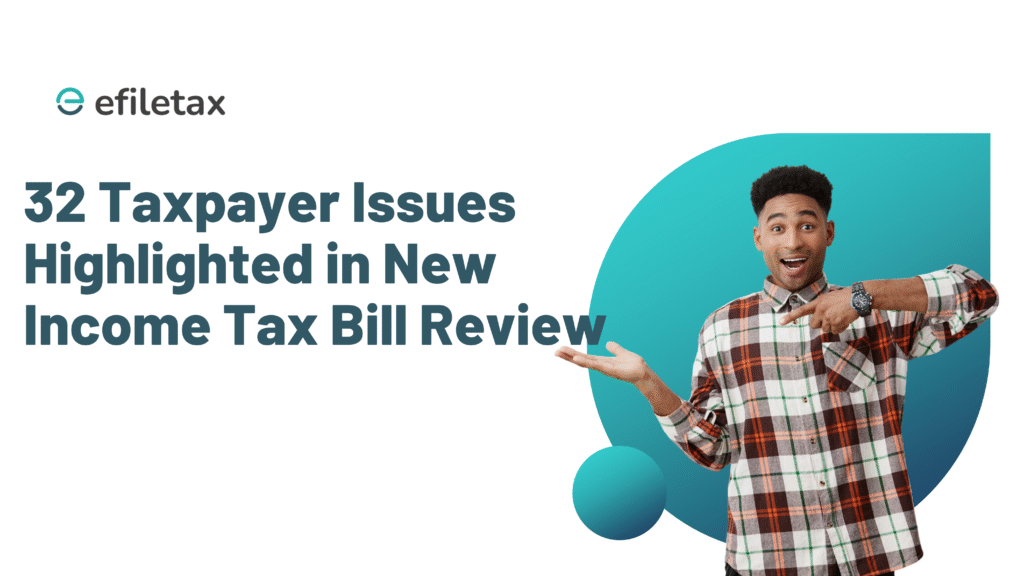
Intro:
The Income Tax Bill 2025 has come under scrutiny as the Parliamentary Standing Committee identified 32 key issues needing urgent attention. From ambiguities in definitions to concerns around taxpayer burden, the report signals that reforms must balance efficiency with fairness. Let’s break it down.
Why Is the Income Tax Bill 2025 Important?
The Bill aims to replace the Income-tax Act, 1961, and introduce a simplified, modern framework. But sweeping changes mean it affects every taxpayer — salaried individuals, startups, MSMEs, professionals, and consultants alike.
The Standing Committee on Finance, chaired by MP Jayant Sinha, submitted its findings on 18 July 2025. The report is now in the public domain and provides valuable insight into how lawmakers view this “new code”.
32 Key Issues Raised in Income Tax Bill 2025
Here’s a simplified summary of the top issues flagged:
1. Lack of Clarity in Definitions
- Terms like “resident”, “agricultural income”, and “digital assets” need clearer definitions.
- Ambiguity may lead to excessive litigation.
2. Taxpayer Relief Measures Missing
- No specific provisions for middle-class relief or citizens.
- Deductions under Chapter VI-A like 80C are missing in the draft, sparking concern.
3. High Compliance Burden for MSMEs and Professionals
- Multiple return filing obligations
- E-invoicing and audit thresholds not aligned with ground realities
4. Digital Taxation Framework Is Incomplete
- No clarity on treatment of income from digital services, influencers, freelancers, or e-commerce.
5. Transition Provisions Are Weak
- Unclear how old disputes, carry-forward losses, or MAT credits will be handled.
- May lead to hardship during the switch from 1961 Act to new law.
6. Appeals and Assessment Process Need Streamlining
- Panel wants better protection for taxpayers against arbitrary assessments.
- Calls for clarity on faceless assessments and time-bound refunds.
Keyphrase Section: Income Tax Bill 2025 Needs More Clarity
The Income Tax Bill 2025 may be progressive on paper, but the Standing Committee urges the Finance Ministry to:
- Provide more clarity in definitions and procedures
- Safeguard taxpayer rights through robust dispute resolution
- Focus on compliance ease, especially for startups and SMEs
- Avoid retrospective application or uncertainty during transition
Legal Basis & Government Source
This review is based on the official Report No. 396 of the Department-related Parliamentary Standing Committee on Finance. The Ministry of Finance (CBDT) is expected to revise the draft based on these inputs before the Bill is re-tabled.
📄 Official Source: Lok Sabha Committee Report on Income Tax Bill, 2025 (Search: Income Tax Bill 2025 Committee Report)
Expert Tip: Simplify Before You Replace
Tax experts caution that completely replacing the Income-tax Act, 1961, without ensuring backward compatibility, could disrupt business planning, increase litigation, and harm ease of doing business. A phased rollout with clear FAQs and government training for tax professionals is crucial.
What’s Next for Taxpayers?
Until the revised Bill is introduced, taxpayers should:
- Stay updated via official sources and trusted advisors
- Maintain compliance under current Income-tax Act, 1961
- Prepare for change by digitising records and adopting tech-driven accounting
How Efiletax Can Help
At Efiletax, we simplify tax changes — whether it’s return filing, regime planning, or transition support. Our team tracks every amendment and advisory to ensure your compliance stays future-proof.
👉 Get expert help on Income Tax compliance →
Optional FAQs
Q1. Will existing deductions like 80C continue under the new Bill?
Not in the current draft. The panel has asked for clarity on this.
Q2. Is the Income Tax Bill 2025 applicable from this year?
No. It’s still under review. Until it’s passed and notified, the 1961 Act continues.
Q3. Will old assessments and appeals be affected?
Unclear. The panel flagged this as a major concern needing clarification.
Summary:
The Income Tax Bill 2025 faces criticism as a parliamentary panel flags 32 issues — unclear definitions, lack of reliefs, and compliance burden. Experts call for more clarity and a phased rollout.